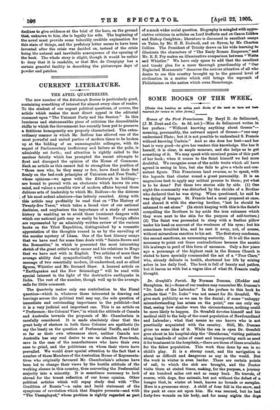C URRENT LITE RAT (IRE.
THE APRIL QUARTERLIES.
The new number of the Edinburgh Review is particularly good, containing something of interest for almost every class of reader. To the student of our urgent political questions, of course, the article which makes the most direct appeal is the editorial comment upon "The Unionist Party and the Session." In this luminous and statesmanlike piece of criticism the discreditable shifts to which the Government has recently been put to preserve a fictitious homogeneity are properly characterised. The extra- ordinary manner in which M.x. Balfour has allowed one of the most powerful and united parties of modern times to be broken up at the bidding of an unmanageable colleague, with its sequel of Parliamentary inefficiency and failure at the polls, is admirably set forth ; and attention is rightly called to the careless fatuity which has prompted the recent attempts to flout and disregard the opinion of the House of Commons. Such an article as this cannot fail to strengthen the position of "those men who, be they many or few, have fixed their feet firmly on the bed-rock principles of Unionism and Free Trade," whose opinions—we agree with the Edinburgh in holding— are bound to prevail with an electorate which knows its own mind, and values a sensible view of modern affairs beyond those dubious arts of leadership to which Mr. Balfour—to the distress of his moat ardent admirers—has latterly resorted. Along with this article may profitably be read that on "The History of Twenty-five Years," which takes a broad view of our national destinies, and emphasises the importance of a study of recent history in enabling us to avoid those imminent dangers with which our national path may so easily be beset. Foreign affairs are represented by an admirably written review of the various books on the Tibet Expedition, distinguished by a romantic appreciation of the thoughts roused in us by the unveiling of the secular mystery of Lhasa. One of the best literary essays that we have read for some time deals with " Sainte-Beuve and the Romantics," in which is presented the most interesting sketch of the great critic's early career and his relations to Hugo that we have met with in English. Two articles of more than average ability deal sympathetically with the work and the message of two essentially modern, ill-understood, and so allied figures, Whistler and Mr. Bernard Shaw. A learned article on "Earthquakes and the New Seismology" will be read with special interest in the light of the destructive earthquake in India. The rest of the number, though well up to the average, calls for little comment.
The Quarteriy makes only one contribution to the Fiscal question--whicla is, whatever those interested in drawing red herrings across tho political trail may say, the sole question of immediate and outstanding importance to the publicist—but it is a very judicial and important one. This is an article on "Preference : the Colonial View," in which the attitude of Canada and Australia towards the proposals of Mr. Chamberlain is carefully considered. It is made absolutely clear that the great body of electors in both these Colonies are apathetic (to say the least) on the question of Preferential Tariffs, and that so far as their own utterances show, neither Canada nor Australia has any real desire to see us abandon Free-trade, save in the case of the manufacturers who have their own axes to grind, and the politicians on whom their views have prevailed. We would draw special attention to the fact that a number of those Members of the Australian House of Representa- tives who originally favoured Mr. Chamberlain's scheme have been led to change their views by the hostile attitude of the working classes in this country, thus converting the Preferential majority into a minority. It is sometimes necessary to look abroad for the truest reflection of our home opinion. Other political articles which will repay study deal with "The Condition of Russia "—a calm and lucid statement of the symptoms of revolution which that Empire presents—and with "The Unemployed," whose problem is rightly regarded as part of a much wider social question. Biography is mingled with appre- ciative criticism in articles on Lord Dufferin and on Canon Liddon and Bishop Creighton ; literature is discussed in excellent essays on Taint), by Mr. H. H. Dodwell, and on Byron, by Mr. Churton Collins. The President of Trinity draws on his wide learning to illustrate the characters of "The Early Roman Emperors," and Mr. R. E. Fry makes an illuminative comparison between "Watts and Whistler." We have only space to add that the excellent and timely plea for a more thorough guardianship of "Our Neglected Monuments" deserves the serious attention of all who desire to see this courftry brought up to the general level of civilisation in a matter which still brings the reproach of Philistinism on the nation which owns Stonehenge.


































 Previous page
Previous page